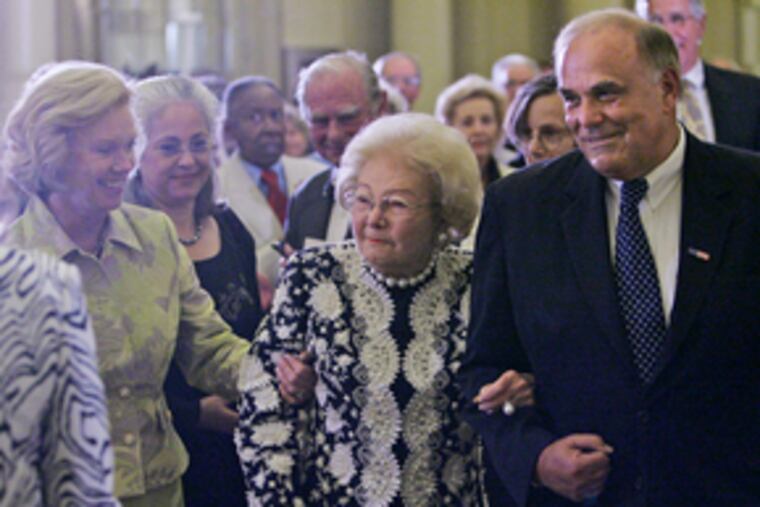Gala night for one who gives much
A visibly moved Leonore Annenberg accepted the 86th annual Philadelphia Award last night from a close friend, Gov. Rendell. "I'm truly, truly overwhelmed," Annenberg, 89, said in the Academy of Music ballroom, for which a $5.3 million renovation grant was given by the Annenberg Foundation last year. "I'm sure you can see how touched I am."

A visibly moved Leonore Annenberg accepted the 86th annual Philadelphia Award last night from a close friend, Gov. Rendell.
"I'm truly, truly overwhelmed," Annenberg, 89, said in the Academy of Music ballroom, for which a $5.3 million renovation grant was given by the Annenberg Foundation last year. "I'm sure you can see how touched I am."
The Philadelphia Award, one of the region's highest honors, was established in 1921 by Edward W. Bok, publisher of Ladies' Home Journal and a Pulitzer Prize-winning author. The prize recognizes a resident of the region who, "during the preceding year, acted and served on behalf of the best interests of the community."
Annenberg was gracious and near tears.
"To pay tribute to me with an award made to my late husband is exceptionally meaningful," the former U.S. chief of protocol under President Ronald Reagan said before an audience of friends and regional leaders.
Walter H. Annenberg, her husband of 52 years and a former publisher of The Inquirer, TV Guide, and other newspapers and magazines, was ambassador to the United Kingdom under President Richard M. Nixon. The philanthropist won the Philadelphia Award, which carries a $25,000 honorarium, in 1993.
The Annenbergs became the first married couple to win the award in separate years. The architects Robert Venturi and Denise Scott Brown shared it in 1992.
After Walter Annenberg's death in 2002, his widow was named president, chair and sole director of the Annenberg Foundation in Radnor. With assets of $2.6 billion, the foundation made almost $48 million in regional grants last year. Among the most prominent gifts was $10 million to keep Thomas Eakins' masterpiece, The Gross Clinic, in Philadelphia, the largest donation in the whirlwind $68 million campaign to retain the painting.
She also gave donations of several millions to the National Constitution Center and several schools of the University of Pennsylvania, and has committed $30 million to move the Barnes Foundation from Lower Merion to the Parkway.
Last night's ceremony and reception were attended by the region's philanthropic leaders, many of whom have benefited from Annenberg largesse.
"She has had a tremendous role in the history and progress of this city," said Rendell, who won the award in 1995 when he was mayor. "As lofty as she may seem, and as elegant as she truly is, Lee is anything but removed. We owe you a tremendous debt of gratitude."
He added, "Walter would be exceptionally proud."
Annenberg threw the governor a kiss and opened welcome arms to him after his presentation.
Anne d'Harnoncourt, director and chief executive officer of the Philadelphia Museum of Art, who won the award in 1997, called Annenberg "one of the great architects of Philadelphia's future."
Annenberg now lives primarily at her Sunnylands estate near Palm Springs, Calif.
In recent years she has been in declining health, and she was accompanied by nurses at the ceremony. She skipped the downstairs reception.
After the hourlong ceremony, which honored her and paid tribute to past winners, 10 of whom were in attendance, Annenberg greeted friends and well-wishers with kisses and personal inquiries.
Eternally stylish, Annenberg was dressed in a striking black coat with white appliqued flowers atop a black dress, black-and-clear spectator pumps that matched her smart Lucite cane, and earrings, necklace, and matching ring with pearls the size of kumquats. She was accompanied by one of her two daughters, Elizabeth Kabler.
"I was shocked," Annenberg said of when she first heard of the honor. "I didn't believe it, but I'm very pleased to get the award."
In establishing the award in 1921, Bok said, "Service to others tends to make lives happy and communities prosperous," and "the idea of service as a test of good citizenship should be kept constantly before the minds of the people of Philadelphia."